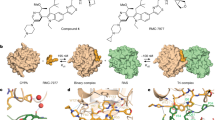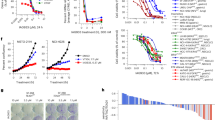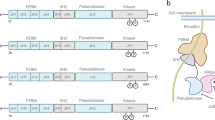Abstract
Oncogenic Ras mutations are widely considered to be locked in a permanent ‘On’ state and ‘constitutively active’. Yet, many healthy people have cells possessing mutant Ras without apparent harm, and in animal models mutant Ras causes transformation only after upregulation of Ras activity. Here, we demonstrate that oncogenic K-Ras is not constitutively active but can be readily activated by upstream stimulants to lead to prolonged strong Ras activity. These data indicate that in addition to targeting K-Ras downstream effectors, interventions to reduce K-Ras activation may have important cancer-preventive value, especially in patients with oncogenic Ras mutations. As other small G proteins are regulated in a similar manner, this concept is likely to apply broadly to the entire Ras family of molecules.
This is a preview of subscription content, access via your institution
Access options
Subscribe to this journal
Receive 50 print issues and online access
$259.00 per year
only $5.18 per issue
Buy this article
- Purchase on Springer Link
- Instant access to full article PDF
Prices may be subject to local taxes which are calculated during checkout


Similar content being viewed by others
References
Spaargaren M, Bischoff JR, McCormick F . Signal transduction by Ras-like GTPases: a potential target for anticancer drugs. Gene Expr 1995; 4: 345–356.
Scheffzek K, Ahmadian MR, Kabsch W, Wiesmuller L, Lautwein A, Schmitz F et al. The Ras-RasGAP complex: structural basis for GTPase activation and its loss in oncogenic Ras mutants. Science 1997; 277: 333–338.
Koeffler HP, McCormick F, Denny C . Molecular mechanisms of cancer. West J Med 1991; 155: 505–514.
Pylayeva-Gupta Y, Grabocka E, Bar-Sagi D . RAS oncogenes: weaving a tumorigenic web. Nat Rev Cancer 2011; 11: 761–774.
Karnoub AE, Weinberg RA . Ras oncogenes: split personalities. Nat Rev Mol Cell Biol 2008; 9: 517–531.
Yan L, McFaul C, Howes N, Leslie J, Lancaster G, Wong T et al. Molecular analysis to detect pancreatic ductal adenocarcinoma in high-risk groups. Gastroenterology 2005; 128: 2124–2130.
Lu X, Xu T, Qian J, Wen X, Wu D . Detecting K-ras and p53 gene mutation from stool and pancreatic juice for diagnosis of early pancreatic cancer. Chin Med J 2002; 115: 1632–1636.
Parsons BL, Meng F . K-RAS mutation in the screening, prognosis and treatment of cancer. Biomark Med 2009; 3: 757–769.
Yakubovskaya MS, Spiegelman V, Luo FC, Malaev S, Salnev A, Zborovskaya I et al. High frequency of K-ras mutations in normal appearing lung tissues and sputum of patients with lung cancer. Int J Cancer 1995; 63: 810–814.
Guerra C, Mijimolle N, Dhawahir A, Dubus P, Barradas M, Serrano M et al. Tumor induction by an endogenous K-ras oncogene is highly dependent on cellular context. Cancer cell 2003; 4: 111–120.
Carriere C, Young AL, Gunn JR, Longnecker DS, Korc M . Acute pancreatitis markedly accelerates pancreatic cancer progression in mice expressing oncogenic Kras. Biochem Biophys Res Commun 2009; 382: 561–565.
Daniluk J, Liu Y, Deng D, Chu J, Huang H, Gaiser S et al. An NF-kappaB pathway-mediated positive feedback loop amplifies Ras activity to pathological levels in mice. J Clin Invest 2012; 122: 1519–1528.
Tada M, Ohashi M, Shiratori Y, Okudaira T, Komatsu Y, Kawabe T et al. Analysis of K-ras gene mutation in hyperplastic duct cells of the pancreas without pancreatic disease. Gastroenterology (Research Support, Non-U.S. Gov't) 1996; 110: 227–231.
Hingorani SR, Petricoin EF, Maitra A, Rajapakse V, King C, Jacobetz MA et al. Preinvasive and invasive ductal pancreatic cancer and its early detection in the mouse. Cancer cell 2003; 4: 437–450.
Ji B, Song J, Tsou L, Bi Y, Gaiser S, Mortensen R et al. Robust acinar cell transgene expression of CreErT via BAC recombineering. Genesis 2008; 46: 390–395.
Ardito CM, Gruner BM, Takeuchi KK, Lubeseder-Martellato C, Teichmann N, Mazur PK et al. EGF Receptor Is Required for KRAS-Induced Pancreatic Tumorigenesis. Cancer cell 2012; 22: 304–317.
Siveke JT, Einwachter H, Sipos B, Lubeseder-Martellato C, Kloppel G, Schmid RM . Concomitant pancreatic activation of Kras(G12D) and Tgfa results in cystic papillary neoplasms reminiscent of human IPMN. Cancer cell 2007; 12: 266–279.
Guerra C, Schuhmacher AJ, Canamero M, Grippo PJ, Verdaguer L, Perez-Gallego L et al. Chronic pancreatitis is essential for induction of pancreatic ductal adenocarcinoma by K-Ras oncogenes in adult mice. Cancer cell 2007; 11: 291–302.
Jackson EL, Willis N, Mercer K, Bronson RT, Crowley D, Montoya R et al. Analysis of lung tumor initiation and progression using conditional expression of oncogenic K-ras. Genes Dev 2001; 15: 3243–3248.
Williams JA, Korc M, Dormer RL . Action of secretagogues on a new preparation of functionally intact, isolated pancreatic acini. Am J Physiol 1978; 235: 517–524.
de Rooij J, Bos JL . Minimal Ras-binding domain of Raf1 can be used as an activation-specific probe for Ras. Oncogene 1997; 14: 623–625.
Acknowledgements
We thank Dr David Tuveson (UK Cambridge Research Institute) for providing the mouse pancreatic cancer cell line K8484. This work was supported by NIH DK052067, CA016672, P20 CA101936, CA155165, P50 CA102701 and the Lockton Endowment. The work was supported in part by grant 30910103911 (to Z Li) from the National Natural Science Foundation of China.
Author information
Authors and Affiliations
Corresponding authors
Ethics declarations
Competing interests
The authors declare no conflict of interest.
Additional information
Supplementary Information accompanies the paper on the Oncogene website
Rights and permissions
About this article
This article is cited by
-
Rapid acceleration of KRAS-mutant pancreatic carcinogenesis via remodeling of tumor immune microenvironment by PPARδ
Nature Communications (2022)
-
Tumor microbiome contributes to an aggressive phenotype in the basal-like subtype of pancreatic cancer
Communications Biology (2021)
-
Targeting KRAS in pancreatic cancer: new drugs on the horizon
Cancer and Metastasis Reviews (2021)
-
Concerted cell and in vivo screen for pancreatic ductal adenocarcinoma (PDA) chemotherapeutics
Scientific Reports (2020)
-
Role of the microbiome in occurrence, development and treatment of pancreatic cancer
Molecular Cancer (2019)



